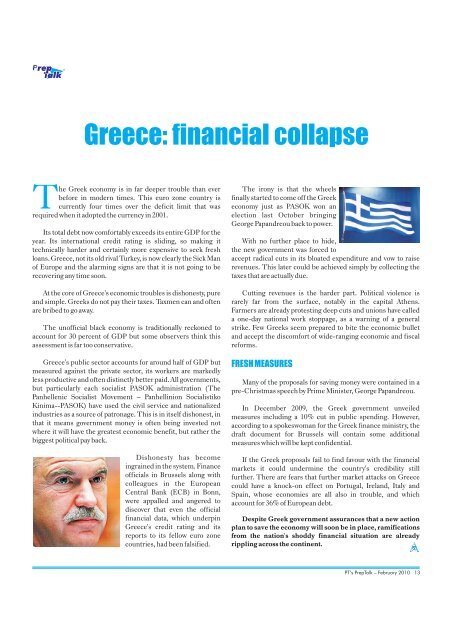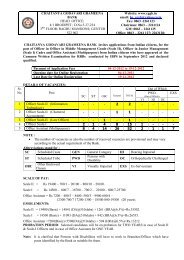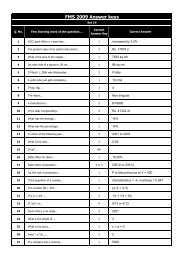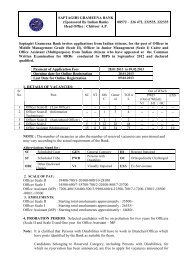Feb 2010_Preptalk new.cdr - Student Resources Centre
Feb 2010_Preptalk new.cdr - Student Resources Centre
Feb 2010_Preptalk new.cdr - Student Resources Centre
You also want an ePaper? Increase the reach of your titles
YUMPU automatically turns print PDFs into web optimized ePapers that Google loves.
Greece: financial collapseThe Greek economy is in far deeper trouble than everbefore in modern times. This euro zone country iscurrently four times over the deficit limit that wasrequired when it adopted the currency in 2001.Its total debt now comfortably exceeds its entire GDP for theyear. Its international credit rating is sliding, so making ittechnically harder and certainly more expensive to seek freshloans. Greece, not its old rival Turkey, is now clearly the Sick Manof Europe and the alarming signs are that it is not going to berecovering any time soon.At the core of Greece's economic troubles is dishonesty, pureand simple. Greeks do not pay their taxes. Taxmen can and oftenare bribed to go away.The unofficial black economy is traditionally reckoned toaccount for 30 percent of GDP but some observers think thisassessment is far too conservative.Greece's public sector accounts for around half of GDP butmeasured against the private sector, its workers are markedlyless productive and often distinctly better paid. All governments,but particularly each socialist PASOK administration (ThePanhellenic Socialist Movement – Panhellinion SocialistikoKinima--PASOK) have used the civil service and nationalizedindustries as a source of patronage. This is in itself dishonest, inthat it means government money is often being invested notwhere it will have the greatest economic benefit, but rather thebiggest political pay back.Dishonesty has becomeingrained in the system. Financeofficials in Brussels along withcolleagues in the EuropeanCentral Bank (ECB) in Bonn,were appalled and angered todiscover that even the officialfinancial data, which underpinGreece's credit rating and itsreports to its fellow euro zonecountries, had been falsified.The irony is that the wheelsfinally started to come off the Greekeconomy just as PASOK won anelection last October bringingGeorge Papandreou back to power.With no further place to hide,the <strong>new</strong> government was forced toaccept radical cuts in its bloated expenditure and vow to raiserevenues. This later could be achieved simply by collecting thetaxes that are actually due.Cutting revenues is the harder part. Political violence israrely far from the surface, notably in the capital Athens.Farmers are already protesting deep cuts and unions have calleda one-day national work stoppage, as a warning of a generalstrike. Few Greeks seem prepared to bite the economic bulletand accept the discomfort of wide-ranging economic and fiscalreforms.FRESH MEASURESMany of the proposals for saving money were contained in apre-Christmas speech by Prime Minister, George Papandreou.In December 2009, the Greek government unveiledmeasures including a 10% cut in public spending. However,according to a spokeswoman for the Greek finance ministry, thedraft document for Brussels will contain some additionalmeasures which will be kept confidential.If the Greek proposals fail to find favour with the financialmarkets it could undermine the country's credibility stillfurther. There are fears that further market attacks on Greececould have a knock-on effect on Portugal, Ireland, Italy andSpain, whose economies are all also in trouble, and whichaccount for 36% of European debt.Despite Greek government assurances that a <strong>new</strong> actionplan to save the economy will soon be in place, ramificationsfrom the nation's shoddy financial situation are alreadyrippling across the continent.PT’s PrepTalk – <strong>Feb</strong>ruary <strong>2010</strong> 13
















